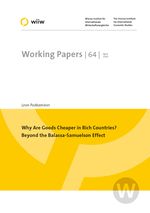Why Are Goods Cheaper in Rich Countries? Beyond the Balassa-Samuelson Effect
wiiw Working Paper No. 64, April 2010
20 pages including 2 Tables and 6 Figures
Relative to consumer services, consumer goods tend to be cheaper in richer European countries. This tendency, customarily explained in terms of cost developments and/or foreign-trade considerations, can be a reflection of a demand-side regularity. An econometrically specified cross-country demand system indicates that goods are 'necessities' while services are 'luxuries'. Relative price of goods responds negatively to the rising supply of goods and positively to the rising supply of services, with the former response being much stronger. If the supply of both items were to rise at the same speed, the relative price of goods would have to fall.
Keywords: relative prices, Balassa-Samuelson Effect, Engel Law, Almost Ideal Demand System, international consumption comparisons, structural change
JEL classification: O14, D12, D51
Countries covered: European Union
Research Areas: Macroeconomic Analysis and Policy, Sectoral studies
